Xerox 5090
Last modified: Dec 13, 2024 @ 2:07 pm
From the Xerox Products Guide 1988-89:
Simply the premier duplicating system. Making 135 copies per minute with on-line permanent binding or stitching, and featuring a Touch Control Screen, the 5090 sets the new standard for productivity, copy quality and ease of use.
The copy quality is comparable to metal-plate master work done on offset duplicators. You can use a broad range of originals, from text to colored line art, halftones, even photos. Books from 15 to 125 pages can be bound with thermal adhesive binding. And 2 to 70 pages can be single- or dual-stitched at the touch of a button. With a 20Mb computer, the 5090 adds yet another level of electronic diagnostics and self adjustment to key functions, thus maximizing performance and uptime. While one job is running, you can set up another (programming, loading, unloading, running)-up to 36 jobs at a time. And at any time you can find out exactly what job is in progress. The full-color Touch Control Screen helps you make full use of all the 5090's many features. All pertinent information is right in front of you-in text or displayed in graphics and icons. Of course, the versatile 5090 easily integrates an extensive list of time-saving features, such as automatic duplexing, cover and tab insertion, document handling, tab imaging, and front and back cover insertion.
| SPECIFICATIONS | |
|---|---|
| Copy speed (per minute) | 135 |
| Paper tray | Three paper trays, plus duplex tray. 4,300-sheet paper supply |
| Output tray capacity | n/a |
| Finisher/sorter | On-line permanent binding |
| Staple function | Single or dual stitching, on-line |
| Reduction/zoom | Automatic reduction and enlargement |
| Document handler | 250-sheet Document Handler |
| Dimension and weight | |
| Depth | 104 (cm) / 41 (inches) |
| Width | 370 (cm) / 145.8 (inches) |
| Height | 155 (cm) / 66.1 (inches) |
| Weight | 1076 (K grams) / 2373 (Lbs) |
| Floor space requirements | 5 x 3 (meters) / 16.4 x 9.8 (feet) |
Do you have any more information about this model, or have brochures / pictures? Please leave a reply in the form below, or send an email to xeroxnostalgia@outlook.com

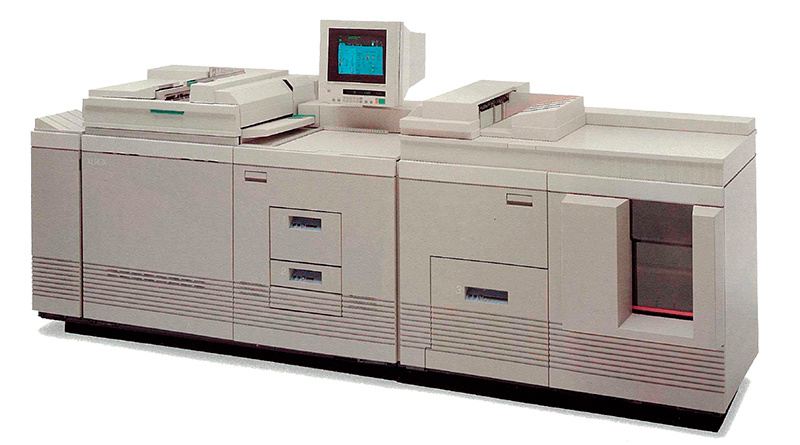
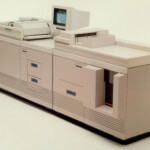
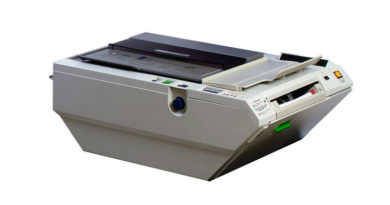
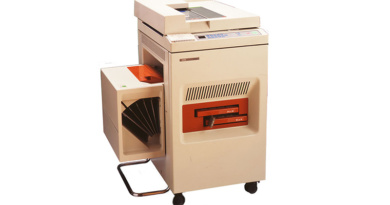
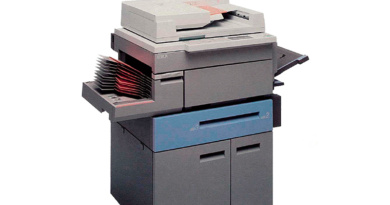
Worked for Xerox out of Lexington Ma. Started out doing PMs on the 9500 and 9900 series copiers. Really learned a lot from many talented coworkers and went to Leesburg in 1991 to train on the 1090 which was one of Xerox best machines. Funniest story walking into hospital for service call and as i was walking down the hall in my suit and black bag a stranger came up to me and asked if I was a doctor. lol
Oh the memories, I can not tell you how many books were made on this type of machine I’ve had to do! Those were the good old days!
I started working for Xerox in southern Illinois in 1967 on the 914 and 813. When I retired in 2000 I was working on the Docutech 5090 and most all the other products through the years including the typewriters. Amazing technology progress. Three years as a Field Liaison Engineer in the 70’s was also an interesting assignment to work as a “go-between” the tech force and the engineers in Rochester, NY. It was a great company and exciting times.
I remember we used 660 grit paper to give the document belts more traction.
We cut them into strips and put them around the neoprene drive roll.
Once they were installed, set registration and you were good to go.
Note to site reps, this site is awesome,….THANKS !
My previous comment on this had my email spelled incorrectly. Please correct it to this one. Thanks!
I have updated your email.
When this machine became available, the only way to get them delivered was to sell enough in one territory to afford training for techs. I had to sell 5 to get them open. My territory included Large Print Shops, Hospitals, High Tech Manufacturing, and Large Legal Offices. I worked hard for about 6 weeks and landed 5 all at one time. Still took weeks for delivery, wait time for service training and shipping, but I had one of the largest sales in the region for many years. Several went to Kinkos, 2 to independent print shops, and another to a… Read more »
Does anyone know how I can find the noise level outputs of the Xerox 5090 copier duplicator with the recirculating document feeder?
Somebody made a field recording in 1996 of the 5090:
https://soundcloud.com/max-foster-168349642/sets/sounds-of-the-xerox-5090
Oh, the CLUNK of that feeder. What kind of wattage must that have pulled? I was amazed when it was running to it’s potential and it would double flash to save wear and tear on collating. It was ironic at the time, given that 9000 series did basically no damage to the originals and was built 20 years earlier.
The clunk of the ADF was the document transport clamping the original on the glass. That transport had vacuum on it, the document was always managed by the transport. Up, move document, clamp, flash document, up, move document back to either inversion or direct to load tray. Fairly complex in design, but simple in operation and worked very well.
Yeah, it was fascinating for sure; I just always worried that the force was going to shatter the platen!
I was a Xerox CSA in Midtown Manhattan – the only walking district in the country – from 90-92, working on these babies. Some of our territories were in a single building. These were fun to work on. Good times.
I worked for a Kinko’s in 1992/93. We had one of these and it was fantastic. So fast, could do so many cool things like binding collated copies and it hardly ever broke down. However, there was one night I had an issue with it. The plastic guide out of tray 2 warped, which caused paper jams. We really needed the 5090 that night, so I macguyver’d it until the Xerox tech showed up. I had rubber bands bending the plastic guide back into alignment, but they got in the way of shutting the doors. The 5090 wouldn’t run with… Read more »
The techs never quite understood the urgency of our deadlines, did they?
Some techs couldn’t be hurried! It was a mistake to separate them from the sales and admin.
Xerox tech from 1985 – 2000. It’s not that we didn’t understand the urgency of your deadlines, it was because in order to maintain the reliability of the machines, besides making sure that the problem we were called out to fix was actually fixed, we had to do maintenance that was due, and check problem areas indicated by error logs. We would try to get someone else to cover for us, but that was not alway possible. If we chased response time instead of reliability, no one was happy because the machines were broken all the time. It’s not like… Read more »
Some techs really went slow, often to make their own point, at the expense of the customer. I recall several techs who refused service in places they had been multiple times, or simply stalled things. I was a tech prior to sales, so it was easy for me to spot. These were the exceptions to the normal standards of excellent service. Eventually the service side won the battle, and high quality sales went away.
When my printer now spits out a sheet with a random spot on it, I check the sheet six pages later to see if it has it too.
I remember working as a System tech in Webster NY. I was responsible for running Carbon-less paper test and testing the dicortrons for impurities from gasses given off from the paper and also preventive maintenance time intervals.. I wish I had pictures but the only thing i might still have was a floppy disk that i wrote a program for the instructions for running the paper, what trays to organize the paper and tabs if any by just selecting the desired outcome and quantity of prints. Was not able to patent that but did get a nice reward and recognition.… Read more »
I completely forgot about storing programs on the floppy’s!